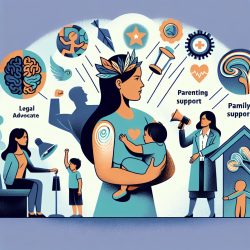Online therapy is becoming an essential service in schools, especially as students face various challenges that can impact their mental health. One critical area that therapists must understand deeply is post-traumatic stress disorder (PTSD), particularly in diverse and disadvantaged populations. Insights from the research paper "Social, Cultural and Ethical Issues in the Traumatic Stress Field" can significantly enhance a practitioner's skills in providing effective therapy.
Understanding the Social and Cultural Context
The research highlights that the impact of psychological trauma varies widely based on social and cultural contexts. Practitioners should be aware that disadvantaged communities, including those facing poverty, stigma, discrimination, disabilities, homelessness, and political repression, are more vulnerable to traumatic stressors and PTSD. This understanding is crucial for tailoring therapy to meet the specific needs of these populations.
Key Findings and Practical Applications
Here are some key findings from the research and their practical applications for online therapy practitioners:
- Chronic Stressors: Chronic stressors like stigma, discrimination, and poverty are significant factors in the development of PTSD. Therapists should consider these elements when assessing and treating clients.
- Cultural Competence: Therapists must adopt a culturally competent approach, which involves understanding and respecting each client's cultural framework, beliefs, and values. This begins with a collaborative discussion to clarify the client's expectations and preferences.
- Avoiding Stereotypes: Avoid making stereotypic assumptions about clients based on their race or culture. Instead, focus on genuinely collaborative and sensitive assessments and treatments.
- Systematic Assessment: A thorough assessment of trauma history should include not just a listing of events but also how the person interpreted these events based on their cultural background.
- Addressing Disparities: Recognize and address disparities in access to social, educational, economic, and healthcare resources, as these disparities increase vulnerability to psychological trauma and PTSD.
Encouraging Further Research
For practitioners looking to improve their skills, engaging with the latest research is invaluable. The findings discussed above are just a starting point. Diving deeper into the full research paper can provide more detailed insights and strategies for effectively addressing PTSD in diverse populations.
To read the original research paper, please follow this link: Social, Cultural and Ethical Issues in the Traumatic Stress Field.










